- Clone
- C1/6.1 (See other available formats)
- Regulatory Status
- RUO
- Other Names
- AAA, ABETA, ABPP, AD1, APPI, CTFgamma, CVAP, PN-II, PN2, Amyloid beta A4 protein, preA4, protease nexin-II, peptidase nexin-II, beta-amyloid peptide, alzheimer disease amyloid protein, cerebral vascular amyloid peptide, APP, Amyloid Precursor Protein
- Previously
-
Covance Catalog# SIG-39152
- Isotype
- Mouse IgG1
- Ave. Rating
- Submit a Review
- Product Citations
- 29 publications
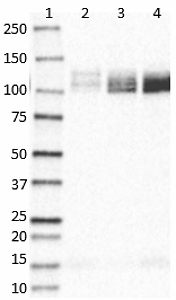
| Cat # | Size | Price | Quantity Check Availability | Save | ||
|---|---|---|---|---|---|---|
| 802802 | 1 mL | 1444€ | ||||
| 802803 | 25 µL | 90€ | ||||
| 802801 | 200 µL | 437€ | ||||
APP functions as a cell surface receptor and performs physiological functions on the surface of neurons relevant to neurite growth, neuronal adhesion and axonogenesis. It is involved in cell mobility and transcription regulation through protein-protein interactions and cleaved either by alpha-secretase, beta-secretase or theta-secretase, leading to generation and extracellular release of soluble APP peptides, S-APP-alpha and S-APP-beta, and the retention of corresponding membrane-anchored C-terminal fragments, C80, C83 and C99. Subsequent processing of C80 and C83 by gamma-secretase yields P3 peptides. This is the major secretory pathway and is non-amyloidogenic. Alternatively, presenilin/nicastrin-mediated gamma-secretase processing of C99 releases the amyloid beta proteins, amyloid-beta 40 and amyloid-beta 42, major components of amyloid plaques, and the cytotoxic C-terminal fragments, gamma-CTF(50), gamma-CTF(57) and gamma-CTF(59). Many other minor beta-amyloid peptides, beta-amyloid 1-X peptides, are found in cerebral spinal fluid (CSF) including the beta-amyloid X-15 peptides, produced from the cleavage by alpha-secretase and all terminating at Gln-686.
Product DetailsProduct Details
- Verified Reactivity
- Human, Mouse, Rat
- Antibody Type
- Monoclonal
- Host Species
- Mouse
- Immunogen
- This antibody was raised against the conserved carboxyl-terminal 20 residues of APP (residues 676-695 of APP695).
- Formulation
- Phosphate-buffered solution (no preservatives or carrier proteins).
- Preparation
- The antibody was purified by affinity chromatography.
- Concentration
- 1 mg/ml
- Storage & Handling
- This antibody should be handled aseptically as it is free of preservatives such as Sodium Azide. Store this antibody undiluted between 2°C and 8°C. Please note the storage condition for this antibody has been changed from -20°C to between 2°C and 8°C. You can also check the vial label or CoA to find the proper storage conditions.
- Application
-
WB - Quality tested
ICC, IP - Reported in the literature, not verified in house - Recommended Usage
-
Each lot of this antibody is quality control tested by Western blotting. For Western blotting, the suggested use of this reagent is 1.0 - 2.0 µg per ml. It is recommended that the reagent be titrated for optimal performance for each application.
- Application Notes
-
This antibody is effective in immunoblotting (WB), immunocytochemistry (ICC), and immunoprecipitation (IP).
- Application References
-
- Lee MH, et al. 2010. Cell Death Dis. e110.
- Jiang Y, et al. 2010. Proc. Natl. Acad. Sci. USA. 107(4):1630-5. (WB, ICC) PubMed
- Laudon H, et al. 2004. J. Biol. Chem. 279(23):23925-32. (IP)
- Grbovic OM, et al. 2003. J. Biol. Chem. 278(33):31261-8. (IP)
- Mathews PM, et al. 2002. J. Biol. Chem. 277(39):36415-24. (WB)
- Product Citations
-
- RRID
-
AB_2564647 (BioLegend Cat. No. 802802)
AB_2715853 (BioLegend Cat. No. 802803)
AB_2564648 (BioLegend Cat. No. 802801)
Antigen Details
- Structure
- Expected MW: APP= 100 kD; alphaCTF & betaCTF= 10 kD
- Biology Area
- Cell Biology, Neurodegeneration, Neuroscience, Protein Misfolding and Aggregation
- Molecular Family
- APP/β-Amyloid
- Gene ID
- 351 View all products for this Gene ID
- UniProt
- View information about APP C-Terminal Fragment on UniProt.org
Related Pages & Pathways
Pages
Related FAQs
Other Formats
View All APP C-Terminal Fragment Reagents Request Custom Conjugation| Description | Clone | Applications |
|---|---|---|
| Purified anti-APP C-Terminal Fragment | C1/6.1 | WB,ICC,IP |
Customers Also Purchased
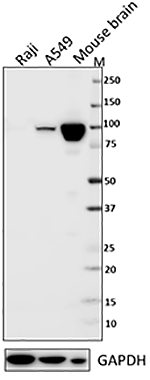
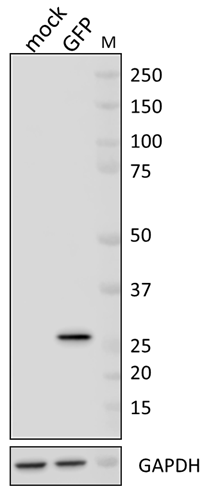
Compare Data Across All Formats
This data display is provided for general comparisons between formats.
Your actual data may vary due to variations in samples, target cells, instruments and their settings, staining conditions, and other factors.
If you need assistance with selecting the best format contact our expert technical support team.
-
Purified anti-APP C-Terminal Fragment
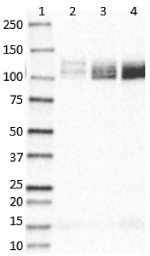
Western blot of purified anti-APP C-Terminal Fragment antibo...

 Login / Register
Login / Register 











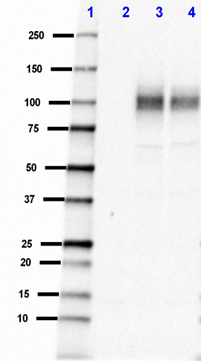







Follow Us